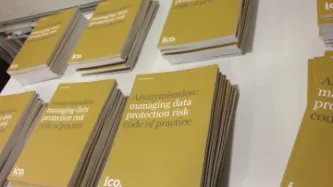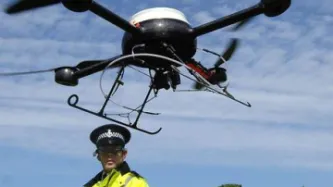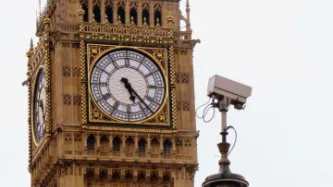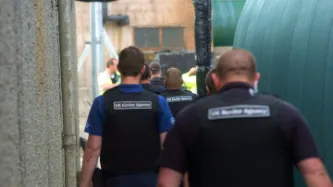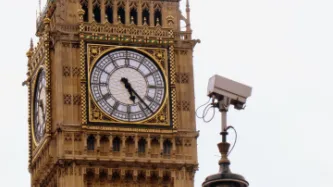Search
Content type: News & Analysis
Privacy International’s campaign for effective export controls of surveillance technology is still ongoing, but for one company, action can already be taken by HM Revenue & Customs to hold stop their unethical practices. Here is the story so far...
Privacy International has been investigating the trade in surveillance technology for almost two years as part of our Big Brother Incorporated project. Our research showed the capabilities of surveillance technology has grown hugely in the…
Content type: News & Analysis
A full analysis of the UK Information Commissioner's "Anonymisation code of practice: managing data protection risk" will take time and working knowledge of how the code is used in practice.
At the launch, the ICO signalled that while they believed the code was now up to scratch, they were open to additions and clarifications given that it is the first document of its kind in the world. We applaud them for this; the code is likely to be copied internationally, so it is particularly…
Content type: News & Analysis
Privacy International is proud to announce our new project, Eyes Wide Open, which aims to pry open the Five Eyes arrangement and bring it under the rule of law. Read our Special Report "Eyes Wide Open" and learn more about the project below.
For almost 70 years, a secret post-war alliance of five English-speaking countries has been building a global surveillance infrastructure to “master the internet” and spy on the worlds communications. This arrangement binds together the US, UK, Canada,…
Content type: News & Analysis
Large institutions tend to focus internally, with minimal regard to the external environment. Open Databecoming institutionalised is not different, and as a leading edge country in opening data, the UK is making the predictable mistakes first:
The UK’s Department for Education (DfE) is currently considering opening data from the National Pupil Database. At a preparation event for this initiative, at which some data was released for use in an ‘appathon’, one participant believed he…
Content type: News & Analysis
As part of the government’s ambitious Open Data programme, the Cabinet Office announced last year that data from the National Pupil Database (NPD) will be made freely available and accessible to all. The NPD, previously only available to researchers on an academic licence, contains a record for every single state school pupil in the country, covering educational attainment from reception to sixth form, as well as characteristics such as attendance, ethnic background and free…
Content type: News & Analysis
The UK Minister for Education, Michael Gove, today stated in Parliament that he would be moving forward his plans to open up the National Pupil Database, and announced a government consultation on the initiative. The Minister promised that "all requests to access extracts of data would go through a robust approval process and successful organisations would be subject to strict terms and conditions covering their handling and use of the data, including having…
Content type: News & Analysis
Drones are back in the headlines, with the news that the Ministry of Defence plans to develop unmanned underwater vehicles for use in submarine warfare. Human rights groups have already raised concerns over the UK’s use of airborne military drones, which have played a key role in UK operations in Afghanistan since 2008. But drone technology is not limited to military uses: the deployment of ‘civilian’ drones, designed for use in home airspace, may be an emerging trend in UK policing.…
Content type: News & Analysis
The recent acquisition of Skype by Microsoft, coupled with a series of infrastructural changes, has resulted in a flurry of responses, concerns and analysis of exactly what kind of assistance Skype can provide to law enforcement agencies. Under this heightened scrutiny, Skype released a statement on their blog on 26th July, purporting to re-affirm their commitment to the privacy of their users.
Privacy International are delighted to read that Skype believes that…
Content type: News & Analysis
The Home Office has been planning a grab for new communications surveillance powers since 2006; today, the Draft Communications Data Bill established in legislative language their ambitions.
Yes, as they will point out, it isn't their the full scope of their ambitions. In 2008, under Labour, they proposed the idea of a vast centralised database of the nation's communications data. In 2009 they abandoned the idea of a central database. Since then, a new government has been elected,…
Content type: Press release
The government today published a draft version of a bill that, if signed into law in its current form, would force Internet Service Providers (ISPs) and mobile phone network providers in Britain to install 'black boxes' in order to collect and store information on everyone's internet and phone activity, and give the police the ability to self-authorise access to this information. However, the Home Office failed to explain whether or not companies like Facebook, Google and Twitter will be…
Content type: News & Analysis
On Thursday 19th April, Privacy International - in partnership with the LSE, the Foundation for Information Policy Research, Open Rights Group and Big Brother Watch - hosted Scrambling for Safety 2012, a discussion of the Home Office's new plans for mass interception in the UK. Around 200 people turned up (despite the sporadic but torrential rain!), and the number of insightful, well-informed questions from the audience proved to us that the Home Office is not going to…
Content type: Press release
An internal Liberal Democrat briefing on Home Office plans to massively expand government surveillance was today passed to Privacy International. The document contains significant evasions and distortions about the proposed 'Communications Capabilities Development Programme' (CCDP), and is clearly intended to persuade unconvinced Lib Dem MPs to vote in favour of the proposal.
The document contains a section entitled 'Remember, under Labour' consisting of a list of the previous government's…
Content type: News & Analysis
Following an extensive campaign by Privacy International and our network of groups in the United Kingdom, the UK Government has decided to abandon its current plans for data sharing legislation.
The government has announced that it will immediately abandon clause 152 of the Coroners and Justice Bill, following on from an open letter that Privacy International sent to the Justice Secretary earlier this week.
As the Sunday Telegraph observed, the eloquence of the letter together with the…
Content type: News & Analysis
Under the Terrorism Act 2000, police agencies in the UK have the power to stop and search within ‘security zones’ as established under order by the Home Secretary. Since February 2001, London has been designated as a security zone.
When this power was used in 2003 at a London protest against the arms trade, the protestors appealed to the courts on privacy grounds. The UK House of Lords ruled that although a stop and search in public was possibly an interference under Article 8(1) of the ECHR,…
Content type: News & Analysis
Privacy International's recent complaint to the UK Information Commissioner has threatened to bring to a halt an imminent plan to fingerprint all domestic and international passengers departing from Heathrow's Terminal 1 and Terminal 5, due to begin on March 27th. The British media is reporting that in response to PI's complaint, the Information Commissioner has advised that passengers should only accept fingerprinting "under protest" until our complaint is resolved.
The prospect of…
Content type: Press release
Privacy International (PI) today filed additional complaints with authorities in Japan, Israel, Korea, Taiwan, Province of China, Thailand and Argentina. On June 27th PI filed simultaneous complaints with Data Protection and Privacy regulators in 32 countries concerning recent revelations of secret disclosures of records from SWIFT to US intelligence agencies.(1)
The disclosures involve the mass transfer of data from SWIFT in Europe to the United States, and possibly direct access by US…
Content type: News & Analysis
Booz Allen Hamilton, Inc., a prominent defence and intelligence consulting and engineering firm, has been hired as an outside "independent" auditor of the CIA and Treasury Department's Terrorist Finance Tracking Program ("TFTP"), which monitors banking transactions made through the Society for Worldwide Interbank Financial Telecommunication (SWIFT). Though Booz Allen's role is to verify that the access to the SWIFT data is not abused, its relationship with the U.S. Government calls its…
Content type: News & Analysis
The UK currently maintains the largest DNA Database in the world and is encouraging other governments to implement similar systems in their respective countries. Using international organisations such as Interpol, participant governments will be able to share and exchange the DNA profiles of their citizens subject to vague legislative provisions, such as 'the interests of crime detection and prevention'.
Background
The successful prosecution of a serial sex offender in 2004 led to…
Content type: News & Analysis
In a tipping of the hat to the Americans, the UK is set to establish the largest border surveillance programme to date. The new programme will involve the collection of biometrics on visitors to the UK, the generation of vast information stores on all Britons and visitors, and a profiling system to identify those worthy of further scrutiny.
This programme does not merely apply to combatting terrorism however; it is for use for general policing matters.
We have archived the 'partial'…
Content type: Press release
The global human rights watchdog Privacy International (PI) has warned that tens of thousands of UK school children are being finger printed by schools, often without the knowledge or consent of their parents.
The electronic finger printing is being conducted as part of a cost cutting "automation" of school libraries. Privacy International has condemned the procedure, branding it "dangerous, illegal and unnecessary", and has called for a prohibition of the technology in schools.
As many as…
Content type: News & Analysis
On July 3rd 2002, the UK Government published a consultation paper on a national identity card. Privacy International has investigated such proposals across the world for more than a decade. Here, we answer all the questions the government has failed to answer.
What sort of ID card does the government have in mind?
What is the difference between an "entitlement" card, and an identity card?
Will an identity card will help eliminate benefit fraud?
Will an identity card help prevent terrorism?
Is…
Content type: News & Analysis
In recent years, the use of Closed Circuit Television (CCTV) in the UK has grown to unprecedented levels. Between £150 and £300 million per year is now spent on a system that involves an estimated 200,000 cameras. According to the British Security Industry Association, more than three quarters of these systems have been professionally installed. Most towns and cities are moving to CCTV surveillance of public areas, housing estates, car parks and public facilities. Growth in the market is…

